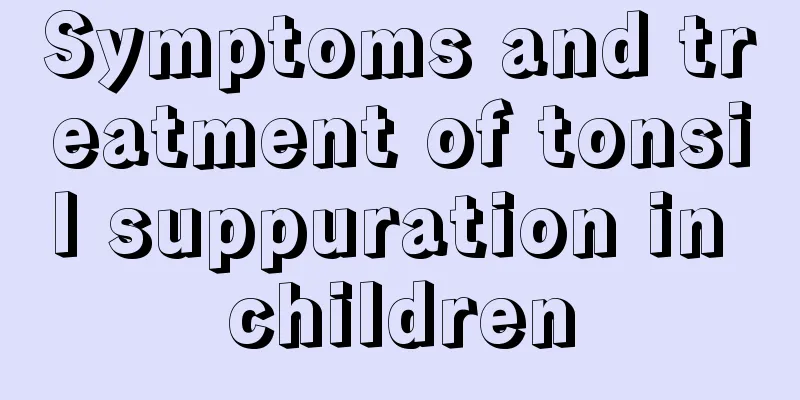What to do if your child does not absorb food

|
Many mothers have had this confusion: their babies have a good appetite, but they just can’t gain weight or grow taller. In fact, this is because the child’s absorption is poor, or the gastrointestinal function is not very perfect. When this happens, it is recommended that mothers seek help from a professional pediatrician or pay attention to choosing an appropriate feeding method to improve the baby's absorption of nutrients and ensure the baby's healthy growth. 1. Choose the feeding method that best suits your baby (1) Breastfeeding or formula feeding Remember, your baby is unique, and finding a feeding method that works for him is the first step in solving his absorption problems. For babies, the best food in the world is your breast milk, unless there are special circumstances where breastfeeding is not possible, then you have to find the best milk substitute. for example: If your baby is naturally lactose intolerant or has α-galactosemia, you need to choose lactose-free formula for your baby; For babies who are allergic to milk, you need to choose formula milk with the corresponding degree of hydrolysis according to the severity of the baby's allergy; For babies with poor digestion, you can focus on choosing formula milk with added probiotics, rich prebiotics, and opo; Babies with other special physical conditions need to choose specific formula milk according to doctors and nutritionists. (2) Reasonable addition of complementary food You may have had this experience: your baby was feeding well and had never had any digestive abnormalities. After adding complementary foods, the baby often suffers from diarrhea and is thinner than before. During physical examinations, the doctor always says that the baby is anemic. After working so hard to plan your baby's diet, you may regret not raising him well. To add complementary foods reasonably, you can actually do this: ① Seize the first time to add complementary food Generally speaking, the time for babies to add complementary foods is 4-6 months. In addition to supplementing certain nutrients, adding complementary foods in time can also exercise the baby's oral chewing and swallowing ability, which is the first hurdle to improve digestion. Food can be fully chewed and crushed in the mouth, and the digestive enzymes in the saliva can perform preliminary digestion of protein and starch, which can ensure better digestion in the stomach and better absorption in the small intestine. The timing of adding complementary foods must be well controlled. Adding it too early can easily cause allergies and obesity; adding it too late will prevent the digestive system from getting timely exercise. Every baby is different. When to add complementary food during 4-6 months depends on the baby. Signals to start adding complementary foods: When your baby shows signs of "being able to sit independently", "1000ml of milk a day is not enough", "food will not be pushed out when fed with a spoon", and "weight is twice that at birth", you can prepare to add complementary foods. ②The particle size is in line with the baby's digestive characteristics In order to enhance the baby's chewing and digestive abilities, complementary foods should be added to the baby according to the baby's age and digestive conditions, from thin to thick, from fine to coarse, and from single to diverse. Don’t feed your baby mushy food all the time, as this will prevent the baby’s digestive system from getting exercise for a long time; also don’t increase the size of food particles too quickly, as this will prevent the baby’s digestive ability from keeping up, resulting in indigestion and affecting nutrient absorption. 4-6 months: juice, paste; 6-7 months: muddy, crumbly; 7-9 months: muddy, crumbly, small pieces; 9-12 months: Crumbs, small chunks, and occasionally mud. Note that each time you add new food, start with a puree and cook the food until it is soft without adding salt or other seasonings. In addition, do not rush your baby to eat. When feeding, make sure to wait until the baby swallows completely before feeding the next mouthful. Chewing slowly and thoroughly can ensure digestion. After 7 months, you can start training your baby to eat alone. Even if your baby uses his hands and makes a mess on the clothes and the floor, you have to bear with it. Otherwise, you will have to chase him to feed him every day. Babies who can't eat well will not absorb nutrients well. |
<<: Can I use a cold towel on my child's forehead when he has a fever?
>>: What to do if baby is addicted to milk?
Recommend
Children often wake up crying when sleeping
If a child often wakes up and cries while sleepin...
Girls' vulvar leukoplakia
Vulvar leukoplakia is considered a relatively ser...
What should I do if a little girl has a lot of hair on her legs?
In life, many little girls who are in the growth ...
What should I do if my child has a fever in June?
Many children are young and just born, especially...
What to do if a one-year-old child has poor digestion
I believe everyone has encountered poor digestion...
What is the effective treatment for mumps in children?
Children are easily affected by mumps. Parents sh...
How to cure prickly heat in children?
Children like to play together and sometimes they...
What to do if the child is weak?
We all know that children are in a period of rapi...
A 100-day-old baby cannot lift his head steadily
When a baby is just born, his physical signs are ...
What should I do if my baby cries while swimming?
Summer is here, and all parents like to take thei...
What to do if fetal scalp edema
Fetal scalp edema is a relatively serious disease...
Causes and treatment suggestions for children's cough
We all know that children have relatively poor ph...
How to prevent tooth decay in children
The occurrence of tooth decay is a phenomenon tha...
Experience on baby's sleep problems
1. Why does my baby always have a restless sleep?...
Newborn baby's stool smells sour
We all know that newborns usually eat their mothe...









